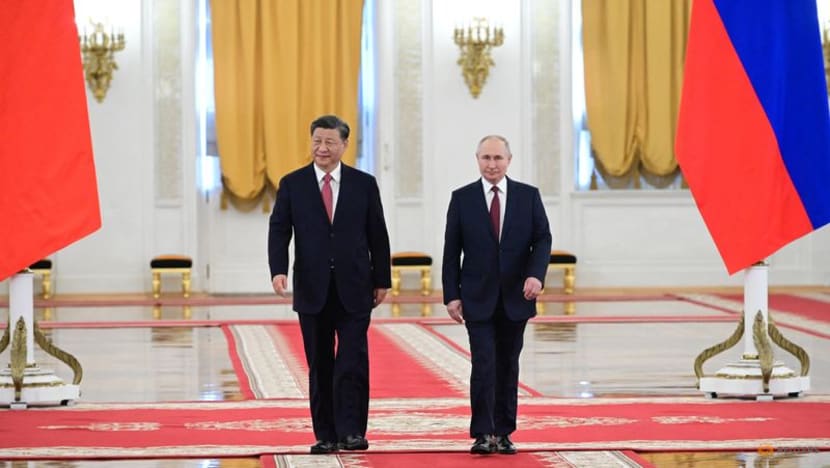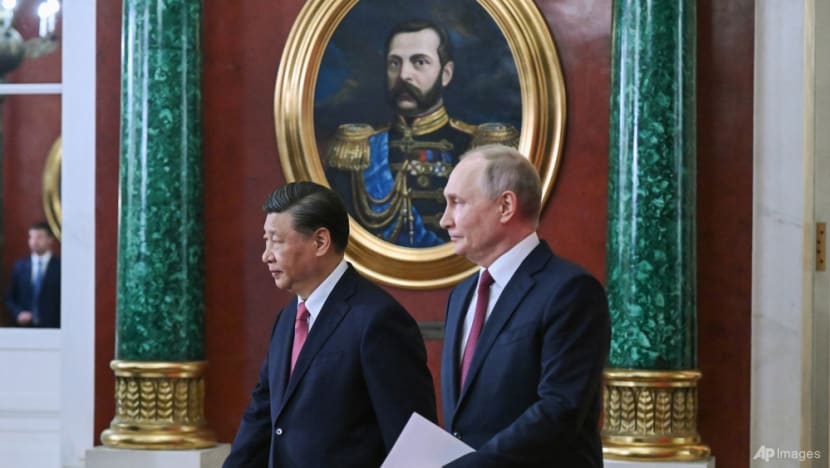Can China be an effective mediator to end the Russia-Ukraine war?
China is taking “safe bet” by portraying itself as a responsible global power promoting peace, despite its recent display of strong ties with Russia at the Xi-Putin summit, said one observer.

China is looking to paint itself as a global power promoting peace, while deflecting criticism that it is siding with Russia in the Ukraine crisis, even if its middleman role remains questionable, said analysts.
This comes after Russian President Vladimir Putin and his Chinese counterpart Xi Jinping met for closely-watched talks in Moscow earlier this week.
The summit was largely a display of unity against the West, with both sides expressing concerns about the North Atlantic Treaty Organization (NATO) expansion in Asia and deepening a strategic partnership that has grown closer since Russia launched its offensive in Ukraine.
But there was little signal of a breakthrough to end the fighting in Ukraine, said observers.
“There's no actual action. There's no substance,” said Associate Professor Li Mingjiang, provost’s chair in international relations at the Nanyang Technological University’s (NTU) S Rajaratnam School of International Studies (RSIS).
SAFE BET FOR CHINA
Dr Li told CNA’s Asia Tonight on Wednesday (Mar 22) that China has taken a position such that it will not bear the blame if there is little progress in peace talks.
“Even if it eventually fails, it won't be China's fault. It will be the participants themselves,” he added.
“So for China, it's a safe bet. You cover peace, you make some general proposal for political settlement and you can gain some moral high ground.”
Mr Raffaello Pantucci, senior fellow at the RSIS, agreed, noting that China is trying to shape and advance a narrative that it is offering a peace plan, in contrast with how some countries are openly sending weapons to aid its favoured side in the war.
“I do think that China is probably thinking, we'll advance some ideas of peace - whether this ultimately resolves the conflict entirely, or at least just demonstrates that,” Mr Pantucci told CNA938’s Asia First on Thursday.
“In other words, it's possible that China is not expecting to resolve this problem.”

Mr Putin had said he was open to talks on Ukraine and praised Beijing's 12-point position paper on the conflict, which includes a call for dialogue and respect for all countries' territorial sovereignty.
DIFFICULT FOR CHINA TO INFLUENCE RUSSIA
The two days of talks at the Kremlin were heavy on pomp and ceremony as both leaders hailed a new era in their countries' relationship.
But the summit has not indicated much movement to end the war, said Mr Pantucci. “We are at exactly the same point, frankly.”
Dr Li said it is going to be tough, “perhaps almost impossible”, for China to exercise any sort of influence on Russia.
China has tried to do everything possible to avoid any negative impact that its statements on the Ukraine war may have on its strategic partnership with Russia, he added.
“So if China would exert any influence on Russia, on any matter that is against Russia's policy preference, you will see growing frustration and perhaps unhappiness.”
Related:
Dr Li noted: “The pro-Russia position that China has held ever since the outbreak of the war cannot be changed. There's a fundamental driving force behind China's policy and posture.
“And the only thing that China can do is to become slightly more neutral and become slightly more active in terms of engaging Ukraine, which may happen in the short term.”
Ukraine's President Volodymyr Zelenskyy had said Kyiv had invited China to talks, and is waiting for an answer from Beijing.
“Certainly, by identifying China as playing a role for peace, it would create a bit of pressure on China, in terms of how China's going to handle Russia,” said Dr Li.
“The fact that China is interested in positioning itself as a mediator, a peacemaker, will automatically generate some pressure for it to be more neutral.”
CHINA’S PLAN ON TAIWAN ISSUE
The ongoing Russia-Ukraine conflict has also put a spotlight on the question of Taiwan and whether China could use military aggression there, said observers, adding that Beijing is using the war as a case study.
“I don't think the Ukraine war is going to change China's overall plan on the Taiwan issue. Its ultimate goal of unification perhaps will stay,” said Dr Li.
“But I think a lot of people will believe that the war itself and the cost that Russia has experienced may have made Chinese decision makers to be more cautious when it comes to the Taiwan issue.”
China will have to make better preparations on various fronts, including economically and politically, he added.
“I think they have to bear in mind the sanctions, economic consequences if there's a military solution to the Taiwan issue.”
SHAKING UP GLOBAL RULES-BASED ORDER
China and Russia have shown support for each other on various political issues, including expanding the role of some institutions that both countries have a large say in, such as the Shanghai Cooperation Organization and the BRICS group of emerging economies, said Dr Li.
On Sunday, US National Security Council spokesman John Kirby said Russia and China are attempting to shake up the international rules-based order that the US and many of its allies have built up since the end of World War II.
He added that both sides would like to rewrite the rules of the game globally.
Beijing and Moscow have both been pushing forward this agenda in different contexts, although it remains to be seen how they would achieve this, said observers.
“I think the real key thing is they're saying there is another option out there - the world that we all live in which is determined by this set of rules and institutions that were built after World War II by the western world in particular, doesn't necessarily have to be the rules that we all live under,” said Mr Pantucci.
“There are other options out there. In terms of what that actually looks like, I think the way that they would sell it would be a far less judgmental world.”
He added that it will be “a very different kind of world”, with the rules likely to be “much more determined by power and might”.















